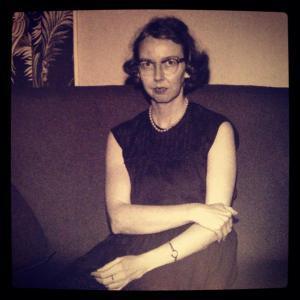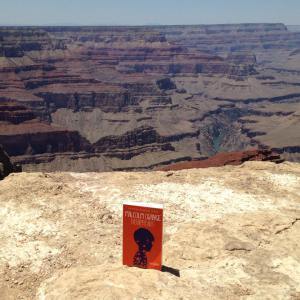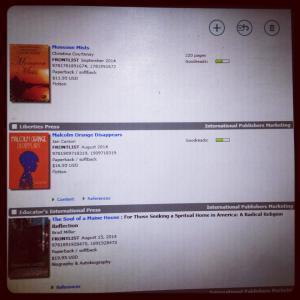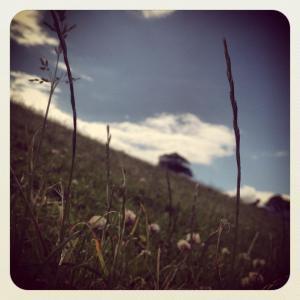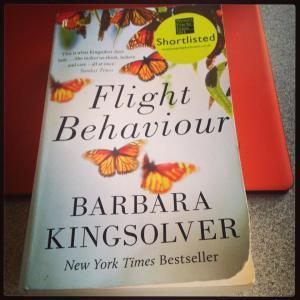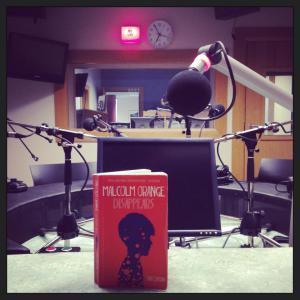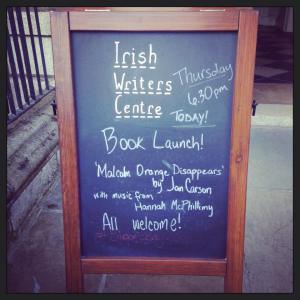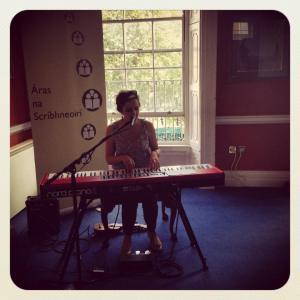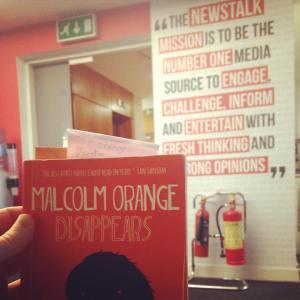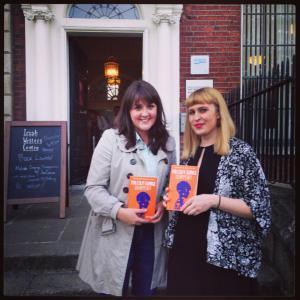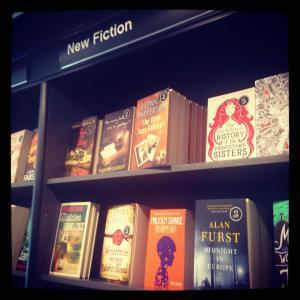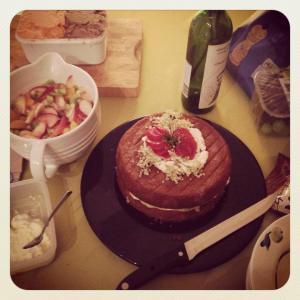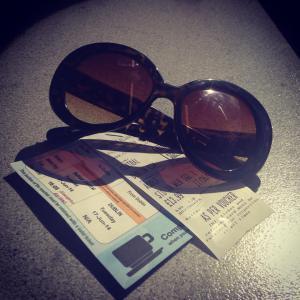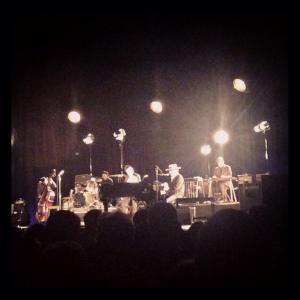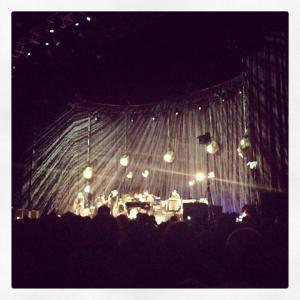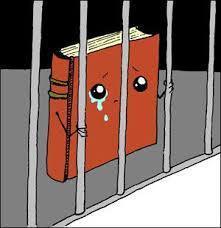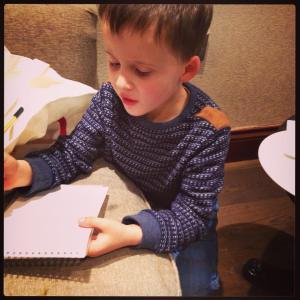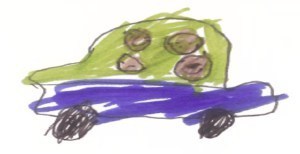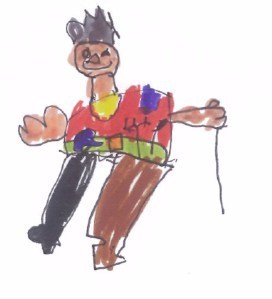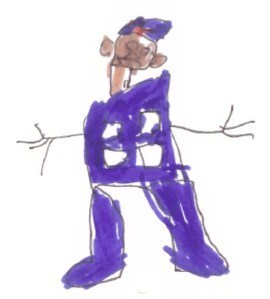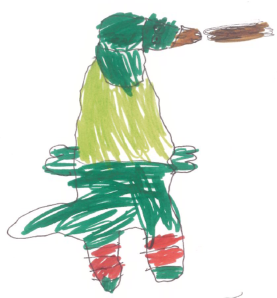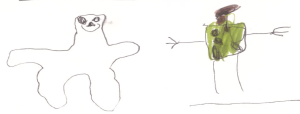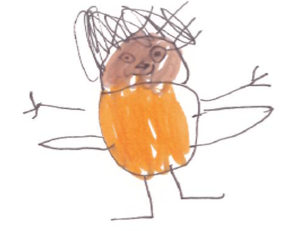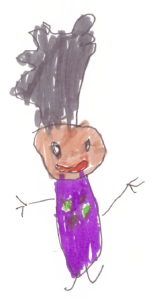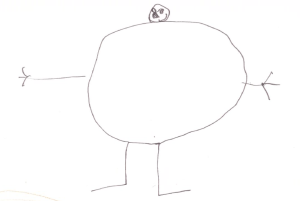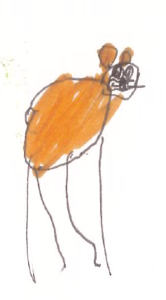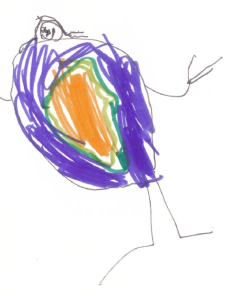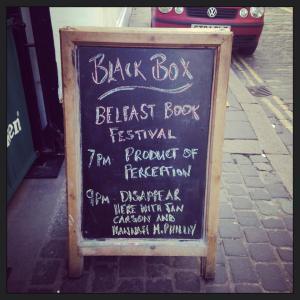Jan Carson's Blog, page 29
July 19, 2014
Falling Asleep Under Flannery O’Connor
I’ve been reading a biography of Flannery O’Connor over the last few days. She’s a bit of a hero of mine; one of my all time favourite writers. However, I have noticed a worrying trend towards the dark side every time I read one of her collections. Sure enough, this afternoon, after 150 pages of young Flannery and her penchant for Catholic guilt and dressing her pet ducks and chickens in custom made outfits, the short story I’ve been working on all week took a turn for the macabre and I had to resist the urge to kill of all my characters. This made me recall, the afternoon, three years ago, when I accidentally fell asleep under a copy of A Good Man is Hard to Find and had the most horrendous, apocalyptic dream about the end of the world. Here it is, transcribed for all those thinking of taking a nap under some Southern Gothic.
Northern Gothic
The summer is keeping her own sweet time.
In-between homes and seasons, I cannot choose between an open window and closed. Equally afraid of drought and flood I keep one curtain open, the other closed; one window flung to the backyard fence, the second, tight-lipped in its plastic frame. I imagine this a fair compromise. The bedroom objects nightly, swinging like a schizophrenic. The evenings are socked and sleeved, the mornings drenched in a glasshouse sweat.
My teeth have taken on a strange, metallic taste. There are dangerous rooms in every door.
On the third night of the second week I fall asleep early with Flannery O’Connor, wide open, on my lap. It is a mistake, a sin perhaps, to fall asleep under Flannery O’Connor. Neither Southern nor Catholic, or even dead, my dreams are not quite old enough to keep pace.
Flannery O’Connor could not care less. She adjusts her reading glasses and bears down on me like a wall-mounted crucifix.
“How did you get in?” I ask.
“You left the window open,” she replies, “You want to be careful about leaving the window open. All sorts of folks could get in through an open window.”
I find myself admitting fault. In the future I will keep my windows tightly closed, guarding against all manner of unwanted writers: Joyce, Poe, Steinbeck and the impossible horror of Heaney, humping all those mucky, potato dreams.
“Might I just have one small corner of the bed,” Flannery O’Connor asks, meek as Mary, legs crossed at the ankle. “The smallest of corners, just a tiny place to rest?”
I do not trust her. I can tell she is sizing up the wallpaper, already critiquing the showy swirls and coronets. She is writing me plain, blunt-faced, over-nosed for a Northern woman. She is casually undermining my intentions, both best and worst. I do not trust her. I am, however, jealous for her gall.
“I don’t trust you,” I say. “You almost always see the worst in people.”
“That may be true,” Flannery O’Connor replies. “But doesn’t it make for a real, good read?”
And with that, Flannery O’Connor takes over the entire bed, occupant notwithstanding. Two miles shy of Dundonald, with a mobile telephone quietly keeping time on the dresser, I dream a dark, Southern dream; a guilty, Catholic, murmur of a thing, so well dreamt I doubt my own authorship.
The end of the world has fallen, not this time upon the Southern States, but rather upon a County Antrim cul-de-sac. The sun has quit her shining. The moon has ceased to be, and I, dressed for Sunday service, am waiting on a ride to some place else.
Though the end of the world has come and gone, I am righteously convinced there is a switch, an ordinary, electric switch, capable of turning the world back on. I stumble between bungalows, fingers fumbling for the on/off lever. As I walk, hesitantly at first, and then with the growing confidence of a full-time drunk, my bare knees make contact with bricks and shrubs, small garden ornaments, the head of a silent, lawn sprinkler. I graze easily. I have always grazed easily.
Having grown up grass-stained and sun burnt in provincial suburbs, I am well-accustomed to garden clutter and expect to encounter such obstacles, loitering in the pitch. I am not expecting the creatures.
Save for the short life of a green-gilled budgie, a solitary goldfish and a seething gaggle of schoolroom tadpoles, I am not accustomed to creatures. I am not a lover of creatures. I am not a dreamer of creatures.
I am not expecting the creatures; dozens and dozens of creatures, both homely and exotic, brushing fuzzily against my ankles, my shins, my elbows and, on one unsettling occasion, the outer rim of my left ear lobe. It is impossible to proceed through this sightless soup of fur and fang. I hunker down on the pavement and, too terrified to breath or refrain from breathing, await a slobbering end.
Flannery O’Connor drips across my lap, dragging downwards like a two ton rosary. “What did expect?” she asks. “Nothing ever turns out nice in my stories.”
I hold my tongue. It seems pointless to protest. I imagine Flannery O’Connor infinitely eloquent when it comes to the last word.
In the dark nothing I find myself acknowledging God’s unquestionable justice, for the light and the darkness- original players on the primordial stage- have vanished first. The creatures, coming later, are granted an extra day. People, I suspect, will be last to leave. I take dry comfort in this thought. What strange world, I wonder, will we occupy on this very last day; lightless, groundless, airless and empty, will there be being at all in such a vast vacuum? Will sin persist without a captive audience?
“Course it will,” mutters Flannery O’Connor, “there’s always sin, girl,” and without warning or sound of retreat, strikes the lights in every window, so the whole street is suddenly blushing, naked blond. There are entirely ordinary people standing in each window. These people are frozen, illuminated, and framed by their velveteen curtains, posing confidently with a paper back book in hand, with a pipe, a dry martini, a finally sleeping baby and a smooth jazz record rotating on the turntable.
“Look at them folks,” says Flannery O’Connor, resorting to Southern-ease, “them folks ain’t no nice folks.”
“They look pretty nice to me.” I say, “They’re just ordinary folk standing in their living rooms doing ordinary things.”
“It’s just cos you’re far away. Step on closer, girl,” she says.
I step closer. I venture into flowerbeds and picture book lawns. I stand ankle deep in shrubbery. I cannot believe my own gall. Flannery O’Connor is right. The ordinary people are not nice. The ordinary people are animals; wild creatures and prehistoric beasts hiding inside ordinary people skins. A long, jagged zip runs from chin to stern, suckering the outside in.
I am shocked. I had not expected wild creatures. I step back, tumbling butt first over children’s toys and ornamental flower pots.
“What is the meaning of this?” I ask but Flannery O’Connor isn’t greatly given to meaning, preferring as she does, dialogue and death and elaborate, acidic endings. She stands upon an upturned bucket and adjusts her reading glasses, making good with her extra foot of judgment.
“Don’t ask me,” she chides. “I just write them.”
“Why don’t you write something nice for a change?” I say. “A happy ending can’t hurt every so often.”
“Folk’s don’t buy happy endings. Folks likes a good tragedy. Tragedy reminds folks of home,” she quips, and turns me slowly by the earlobes, so I can take in the entire cul-de-sac.
With the lights up and the world no longer ending I can see there are wild creatures on every doorstep. Leopards fornicating on the front lawns. Lions pacing the gum-puckered pavements. Domesticated goats, Labrador dogs, sheep, cows, bandy deers and kangaroos congregating by the garage doors. One-armed sloths and prehistoric beasts are swinging from the telephone wires. A solitary crocodile winds its way towards the telephone box, green tail grooming the asphalt into loopy ribbons.
I am shocked. I step back and then, remembering the inside creatures, suddenly forwards and wobble there, hesitating in the flowerbed, caught between the lesser evils.
“Curious?” asks Flannery O’Connor, and despite the teeth I admit to a certain amount of morbid curiosity.
“Step on closer, girl,” she urges, placing a small, sweaty hand on the base of my spine, “take yourself a nosy look at them wild, wild creatures.”
I step forwards. I take a long, Northern look. The creatures are people, ordinary small and larger people, wearing contact lenses and false teeth and kindly smiles as they hide inside wild creature skins. A big, jagged zip runs from chin to stern, suckering the inside in.
I am shocked, I had not expected ordinary people.
I examine my neck, and sure enough I am also zippered. The metal teeth begin at my chin and disappear into my shirt collar some six inches below. I look at my feet and, encased in high top sneakers, they offer no further insight. I examine my hands curiously. The left is flesh, the right fur.
“Hey,” I whisper, addressing a small crowd of stationary creatures. “Am I one of you or one of them?”
None of the outside creatures answer though the crocodile looks capable of swallowing me whole.
“No point in talkin’, girl.” explains Flannery O’Connor. “Them folks can’t hear you. You’re just having yourself a bad, bad dream.”
Flannery O’Connor and I are finished. Tomorrow evening I will fall asleep under someone nicer, someone distinctly less Southern; Enid Blyton most likely.


July 14, 2014
Malcolm in America
Now Malcolm Orange is no stranger to America. As you can see he’s already been to the Grand Canyon and there’s further evidence afoot that he’s touched down in Death Valley, Oklahoma and possibly New York City; he’s a very well-travelled young man.
I’ve just received a screen shot of next month’s American releases and the good news is that Malcolm’s going to be getting an official release and print run in the USA probably during the first week of August, (he’s off to the printer next week and should be hitting shelves the week after). Lot’s of you have been asking how you can get your hands on a copy of the book. You can order off Amazon US but it would be absolutely fantastic if you could take the time to head down to your local book store and place an order there. This shouldn’t cost anything and will help to stimulate interest in the book and also support your local independent book stores which is something I really strongly believe in.
If you have any links to press, either online or print media in the US I would very much appreciate any introductions. We’ve been able to get lots of press coverage here and it’s really helped sales and also profiling for the book. Give me a wee shout if you know someone who might be able to help and hopefully in the next few weeks The Guardian review should be in to encourage media interest. Press here have been particularly interested in the way older people and issues relating to dementia are profiled in the book and as it’s set in Portland, Oregon, American press might have similar interests.
Finally, I’m just finalising the details for my US trip in September and October. I’ll be in Salt Lake City, LA, Portland, OR, Seattle, Vancouver, Madison, Duluth, Minneapolis, Nashville, Washington DC, Baltimore, Philadelphia and NYC so if you, or someone you know, has a space which might be interested in hosting a reading or a writing workshop I’d absolutely love to have a chat with you. Can’t wait to see some more photos of Malcolm on his American adventures.


July 10, 2014
Why Bother?
It’s been a very long week and it’s only Thursday. Despite the fact that things have calmed down a little in terms of readings and interviews, I can’t remember ever being this tired before. Getting out of bed in the morning is a gargantuan effort, almost as taxing as trying to get to sleep at night. The patented Ulster Hall self-diagnosis procedure, (typing your symptoms into Google and hoping for the best), seemed to suggest that I had either anaemia or syphilis, (I know which one I was rooting for), but a wee trip to the doctor confirmed it was only low blood pressure and general exhaustion. Though it was good to discover I didn’t have a slow descent into madness ahead of me, it’s fair to say I’m still not feeling terribly motivated. My general inclination this week is towards box sets, the sofa and meals which require no chopping, stirring or other strenuous effort.
This was also the week in which it finally descended upon me, (despite years of reading articles and being repetitively reminded by other writers), that I’m never going to make enough money from writing to support myself. I think most of us read The Guardian article which was doing the rounds this week- the one where Will Self burst the bubble for all those who entertain JK Rowling-esque career ambitions- with a kind of weary, pre-existing horror suddenly given the numbers and statistics to take root. The best we can hope for is about £3,000 a year income from book sales, barely enough to keep me in QFT tickets and Yumm Bowls. The worst, might even be negative income, by the time you add up all those journeys to read in provincial libraries and Bob Dylan books bought for “research purposes.” I shall, I’m once again reminded, not be giving up the day job any time soon.
So, why bother writing? The artist in me, wants to argue that I write because I can’t not write. This week I spit on that artist. I don’t want to write in the tiny little gaps between work and friends and washing the windows so I can finally see that summer has descended upon East Belfast. I want to lie on the sofa and watch the entire box set of the X Files. I want to read other people’s writing. I want to go and sit on the beach in the sun while it’s still there and not have to take into consideration the fact that writing on a lap top outside is a squinty, screen-glaring impossibility, despite the two dozen or more non-writers who, every summer, suggest I should take my manuscript outside and work on it in the sun with a nice glass of wine. I really am not “feeling” writing on any level this week.
However, between bouts of dizziness, headaches, writers’ block and many, many episodes of Don’t Tell the Bride I’ve been asking myself some very honest questions about writing and I’m starting to draw some conclusions. Writing, for me is a number of things I simply can’t afford to get rid of, none of which involve monetary gain, (thank goodness for that). I do write because I am compelled to and even though this week I’d rather take up jogging than sit down and write, I’m pretty sure that if I neglected the words for too long, the desire would come back to me eventually and I’d be compelled to drag my laptop out of hibernation. Secondly I’ve realised that I write, even when I’m not trying to directly express what’s going on internally, to order my thoughts, to address my anxieties, to try and spring clean my head so I can be a functional human being around other people. Without writing I feel cluttered inside and far too introspective; it’s a safety valve of sorts for people like myself who have a tendency to live within their own heads. Finally, I’ve realised that there is nothing which makes me happier or more like myself than writing a good sentence. This week I’ve written zero good sentences but I’ve read over some damn good sentences I’d already written for the new novel and it was reassuring to be reminded that I am both capable of writing well and enlivened by the process.
So, I’m not going to stop writing, no matter what Will Self tells me or how many other priorities I have to pinch to create some writing room in the day. I’m going to rest a little this week, catch up with myself and the people who are important to me, read some books, drink some wine, sit out in the sun/perpetual drizzle and remember that this is not a fun run round Stormont Park I’ve signed up for. This is the long distance equivalent of running an ultra-marathon through the Sahara desert, whilst wearing high heels AND paying for the privilege simply because I’m at my best when I run. Standing still, I’m beginning to admit, has never really been an option.


July 5, 2014
When Old Friends Let You Down
I’m a long term Bob Dylan fan so I know what it is to find myself a little disappointed with the odd piece of slightly inferior art. One song, one show, one substandard novel in a lifetime of truly fantastic work is not enough to compromise my devotion. However, this year I’ve had a rotten run of substandard reads from writers I’d usually take a bullet for.
It started with Michael Chabon’s Telegraph Avenue which, and this is extremely rare for me, I abandoned after a hundred pages. Then there was Donna Tartt’s The Goldfinch- less said, the better there, (an outlook clearly wasted on Ms Tartt). I managed to finish it, but instantly regretted bothering and ever since have wished to have the three weeks of my life squandered on The Goldfinch returned to use more profitably, possibly reading Agatha Christie paperbacks. With Murakami’s three volume mega-beast of a novel sitting on my bedside table, I’m starting to wonder if all my go to writers are going to prove themselves bloated and disappointing this year.
Chief amongst the old friends who’ve recently let me down is Barbara Kingsolver. Last week I waded through Flight Behaviour; a book I’ve been saving up as a comfort read for months. Since my first read of The Poisonwood Bible, I’ve been a massive devotee of Kingsolver’s work, enjoying her unaffected writing style and way of painting carefully drawn, utterly believable and strikingly nuanced characters. Kingsolver is a master of the small town saga, slowly revealed. Her novels unfold gently and take time to breathe. The message is always there, but frequently complex and always implied rather than preached.Flight Behaviour however, seemed to have a real, driving mandate to tackle issues around climate change. Where Kingsolver’s other books casually address similar issues, this latest offering lost me with its awkward conversations littered with science speak, it’s statistics and slightly schizophrenic chief protagonist who fluctuated between backwater hick and extremely nuanced and eloquent devotee of environmental awareness. Many of her observations about the environment seemed contrived and purposefully placed to drive Kingsolver’s point home rather than enhance the novel as a whole.
I know a lot of people enjoyed Flight Behaviour and there are small sections of the novel which reveal Kingsolver as the master storyteller and character-creator she so obviously is, (I’m particularly thinking of the relationship between the main character and her children). However, there are large sections where the writing takes a backseat to the issues which I felt Kingsolver was trying to force upon her readers in an uncharacteristically heavy-handed way. Now, I’m a bad and evil person when it comes to using art for the purpose of advocacy. Unless the creative vehicle is extremely well-delivered- imaginative, engaging, believable- I’m uncomfortable with using art as a means to advocate for an issue, no matter how important. I’ve been burnt by issues-based fiction in the past. I loved Dave Eggers writing and thought You Shall Know Us By Our Velocity was a subtle, stunning and witty commentary on American capitalism, then he started preaching about real life important issues in books like What Is The What and Zeitoun. I grew bored. They weren’t half as well-written as his “proper” fiction. Ian McEwan, (whom I adore and have made a point of reading in entirety), also lost me with Solar, where the story seemed to fade into insignificance behind the science.
Of course I’m not suggesting that fiction isn’t the place to tackle important issues. The environment, injustice, war, politics and sexuality, amongst other fundamental issues, appear with significant frequency in most of my favourite books. Yet, in the context of a novel, I am most likely to engage with the issue when it’s delivered in the guise of a story, rather than forced upon me, awkwardly in the shape of ill-placed facts and statistics. Flight Behaviour is a decent novel about climate change but it’s not a great advocacy novel for the science and the story haven’t fused properly. They sit awkwardly side by side like second cousins trying to mingle at a family funeral. Kingsolver is more than capable of weaving the harsh truth into her fiction; The Poisonwood Bible challenged religious assumptions, ideas of empire and patriarchy without ever once sounding like a sermon. It was a book which stuck with me for a long time and made me ask difficult questions about my own beliefs and practices. When art advocates well, it can prove to be the most powerful tool for changing prevailing attitudes.
I’m not done with Barbara Kingsolver. She has many more great novels and short stories to write but I’d be lying if I didn’t say I was a little disappointed in her latest offering. In the mean time I might go back and revisit The Poisonwood Bible.


June 28, 2014
Performance Anxiety
It’s been almost two months since I last wrote anything more creative than a magazine article. Whilst I had wonderful intentions of ploughing on with short stories or even making it through the next chapter of my second novel, the reality of publishing a book and working full time has been a lot more taxing than I’d expected. This afternoon I gave my last reading for a couple of weeks in Hodges Figgis; a beautiful book store situated in a stunning, historical building in Dublin City Centre. I tried to do a quick count in my head and I think that today’s reading was somewhere around my 24th speaking engagement since the launch of Malcolm Orange Disappears at the beginning of June. I caught sight of myself in the shop window on the way out, (I have to admit I was admiring the lovely arrangement of Malcolm’s in HF’s summer reading display), and I looked positively grey. Reading your work in public is the ultimate adrenalin rush- the performer in me loves seeing the audience react to the text- however, my throat is beginning to feel permanently bruised, I’m running out of performance lipstick and to be honest, I’ll be pretty glad to give the public appearances a rest for a wee while, if only to catch up with my laundry, (I’ve not a stitch of clean, authorial black clothing left to wear).
On Monday I go back to writing my second novel, Roundabouts. I left it at the awkward halfway point, hanging 50,000 words in, between infancy and completion. Part of me can’t wait to get back to it. Emma and Stevie, my lead characters, have not let me be over the last eight weeks. Little nuggets of ideas have bubbled to the surface in the middle of the night; plot twists and conversations combining with my missing bedroom curtains to ensure I haven’t had a full night’s sleep in weeks. The idea of retreating to a coffee shop, slipping on the headphones and blocking out the real world is infinitely appealing. I’m aiming to have this novel completed by November 1st, which means at least 50,000 more words in 4 months. That’s just over 10,000 words a month, a mere 3,000 per week. Surely that should be achievable considering the Arts Council have supplied me with the means to forget about work for 3 out of 4 of those months. Completing Roundabouts, I keep reassuring myself, is no big task.
Then I begin to get overwhelmed by the prospect. It’s not time nor energy which worries me, it’s the emotions involved in trying to improve upon, or at very least equal, previous efforts at writing. Over the last two months lots of people have said lots of very complementary things about my writing. Malcolm Orange has been championed by people whose writing and judgment I’ve held on a much-deserved pedestal for a long time. Though the process has been a little overwhelming, I’m beginning to come round to the idea of being quietly and modestly proud of Malcolm. I’m just not sure if I can manage to wade my way through another novel.
So, this weekend, with Tuesday 1st July (my proposed re-entry point for Roundabouts), looming like the first day of a new term, I’m feeling rather fragile. What if the ideas just won’t translate to paper? What if the first 50,000 words are rubbish and the next 50,000 traipse merrily down the same path? What if I’m one of those writer who only has one decent book in them? All of these are legitimate questions; little demons which need to be stared down each time I sit in front of the keyboard. Regardless of all my current insecurities, (and, despite the kind words, let me admit that I have never been more artistically insecure), the fact remains that I will have to write on Tuesday. Not because of deadlines or duty or even some self-righteous drive to prove myself, but simply because I cannot keep from writing and these last two months- my longest period of creative abstinence in almost a decade- I have felt like a large and rather significant part of me has been missing. I’m stealing myself for the week ahead; two parts terrified, one part more than ready to get back on t


June 22, 2014
The Week That Was
It’s almost midday on Sunday and I have yet to make it out of my pyjamas. I’m drinking a huge vat of tea, watching Miss Marple and trying to feel more like a functional human. Last night it took me almost two hours to excavate the floor from beneath the pile of clothes, shoes and scribbled on bits of paper which have, of late, passed for a bedroom carpet. This last week has felt a little like being run over by a bus, repeatedly. Up and down to Dublin three times in two days for events and interviews, a packed schedule of wonderful projects at the Ulster Hall and the incredible high of seeing Malcolm Orange Disappears on the shelves at Waterstones, have all made for a memorable, if somewhat overwhelming seven days. Somewhere in the mix I’ve lost my Iphone screen (again), my ability to sleep for more than five hours and my favourite sunglasses; small sacrifices in the grander scheme of things.
About two months ago I wrote about gearing myself up for a packed May and yet, as June progresses, things show no sign of slowing down or becoming any less hectic. It’s a little like being caught up in a merry go round that just keeps speeding up. This week has been extremely rough in places. There have been moments when my body has felt like it’s just about to give up and fall over, times when I’ve felt so overwhelmed by my diary that I’ve wanted to get in the car and disappear for a few weeks and whole half hours when I’ve simply run out of words and found myself staring blankly at my office wall. I’m not complaining. It’s an incredible journey to be on and exhaustion is the natural side effect of having enjoyed so many positive experiences crammed into one small week. Visiting the Newsweek studio in Dublin for an interview with David McWilliams was wonderful, as was the Irish Writers’ Centre Launch, the incredible dance workshops we hosted for young people with disabilities yesterday, and of course, Mr Dylan in concert. These are just four small snapshots from a week where I have felt incredibly fortunate to be doing what I do.
It’s been a big week and an extremely good week and, tired as I am, this schedule is really beginning to teach me a lot about living in the moment and not panicking too much about tomorrow. If I don’t take the time to enjoy each new experience as it arrives and I spend my energy focusing on next week’s mountains, all of this is going to fly past me unappreciated. As someone so rightly said to me yesterday, “there will be other books, but you’ll never get the chance to enjoy your first book again.” So I’m blogging some photos this morning of where I’ve been in the last seven days. Everything from national radio to bouncing around like half wits at Izzy’s fourth birthday and watching the sun come down over Cave Hill with cake and good friends. It’s been an avalanche of a week, in the very best sense.


June 21, 2014
“I Was So Much Older Then” – On Bob Dylan and Aging
This week I travelled to Dublin and back three times in two days, (600 miles in total for those of you not familiar with the Drogheda bypass). Two trips were book related, and therefore, necessary; the third a pilgrimage of sheer self-indulgence. Despite years of slavish devotion I’ve only once managed to catch Dylan live and so, when the opportunity to see Bob play Dublin arose, despite reservations, (Bob will be mediocre, I will be exhausted, Bob will die before the concert date rolls round), I decided that I really needed to go. I had lowish expectations. My only other Dylan concert experience had been dull, excessively long and, in places, incomprehensible, (it was during his, standing at the back of the stage scowling in a cowboy hat phase). I was hoping for maybe two decent songs and two more from the faintly recognisable column. I was not expecting 1964.
I have to say I was pleasantly surprised. Whilst far from talkative, Bob looked happier than I’ve seen him in years. He appeared frailer than I was anticipating but dapper in his striped trousers and hat. He seemed comfortable to stand centre front and even shuffle-danced along with some of the instrumental sections. He played harmonica and piano, switching easily between instruments and songs. He sang “All Along the Watchtower”, “Tangled Up In Blue”, “A Simple Twist of Fate” and even had a stab at “Blowin’ In The Wind” which, I must admit, has always been a little too preachy for my liking and had not really improved with age or reworking. Of course, there was a fair amount of filler too. Newer songs, despite masterful backing from the incredible musicians Bob has surrounded himself with, lack the subtle and cryptic wordery which first drew me to Dylan’s work. I’m not sure why this is. Dylan, in interview is still sharp as brass tacks and yet lately his lyrics have struck me as somewhat trite and clichéd. I know he’s still the consummate poet and yet I find his more recent songs, for the most part, lyrically unsatisfying. (It’s just a small criticism, a tiny footnote against a canon of work so devastatingly brilliant that the greater good will always overshadow the small pockets of mediocrity).
I am fully aware that Bob Dylan is 73 years old now and it is an achievement in itself to still be gigging so furiously and intently after fifty years in the business. I don’t expect him to have the same voice he had at 23. I don’t expect him to have the same physical capability with a guitar or the same ability to cast a foreboding presence across a stage. I don’t even expect him to have sustained a passion for the same kind of music he was once consumed by in his 20s and 30s, (people change as they grow older and only the dullest of artists would remain predictably consistent across a half decade career). However, on Tuesday evening I seemed to be surrounded by people who were expecting some sort of time warp to have descended upon the O2. “Dylan’s f***ing done,” “he looks like he can’t be arsed to be here,” “he should let other people do his songs properly.” I would have punched someone if the average age of critic hadn’t been approximately 75. People seemed shocked to see a 73 year old man on stage who no longer sounded, or acted, the same as he had in his early twenties.
I’ve spent a lot of time in the last few years observing and investigating older people’s engagement with the arts. Last week I visited Scottish Ballet in Glasgow to observe their fantastic over 65s ballet programme. Whilst visiting Glasgow we discussed perceptions of age across the various art forms. I was shocked to discover that the Turner Prize, (existing, as it does, to nurture emerging talent in the visual arts arena), is not open to artists over 50. Can people over 50 not develop an artistic practice? Why are they exempt on the basis of age rather than the duration of their artistic career? Similarly in performance based arts arenas such as dance and contemporary music, artists are often relegated to the scrap heap; tolerated, (like Dylan and many of his contemporaries), if they toe the line and indulge the audience’s desire for nostalgia, or perhaps worst of all, allowed to become caricatures of their former selves like the Rolling Stones. Meanwhile in the literary scene, writers are venerated, celebrated and awarded major prizes as they age. Heaney in his later years was undoubtedly beginning to show his age and yet, at his readings, the audience sat rapt, patient and entranced as he read with careful deliberation from his own canon of work. Film makers such as Woody Allen and Clint Eastwood are still practicing their art and exploring new creative avenues well into later life. I’d like to think it’s not so, but perhaps we’re not comfortable with the reality of age confronting us from a stage in live performance, and older people’s artistic practice is more palatable when experienced as a piece of writing, a play or film, which doesn’t confront us directly with the limitations and, sometimes indignities, which old age can visit upon an artist.
As I watched Bob Dylan on stage singing “She’s Got Everything She Needs” (a particular favourite of mine from his early period), with such incredible dignity, character and musicality I was struck by a deep sense of gladness that he wasn’t trying to perform it with the earnest nonchalance of his twenty something self. This was the voice of an artist who’s lived many, many lives, who embodied the words and music with a richness and weight he could not possibly have understood when he first wrote this song. I cried a little because it was still a stunningly beautiful song but it’s a different song on the lips of a 73 year old man. Perhaps, we need to rethink how we view aging as an artistic experience. We need to stop saying idiotic and ugly things like “Bob Dylan’s done,” and “he can’t do his own songs properly anymore.” Surely, it would be more profitable and honouring, to celebrate our artists as they grow older, to allow them space in which to explore new avenues or interpretations of their work, without labelling this as somehow less or a failure to sustain former glories.
I have more to consider on this topic and I’m sure i’ll revisit it as I continue to work with older artists. However, for now I’ll leave you with lyrics from Dylan’s best song from Tuesday night; a song, which, when performed by a now elderly man, took on a particularly bittersweet poignancy.
What good am I then to others and me
If I’ve had every chance and still fail to see
If my hands are tied must I not wonder within
Who tied them and why and where must I have been?


June 15, 2014
Killing My Bookish Friends
After two years of faithfully documenting and reviewing every single book I’ve read I have decided to draw a line under My Bookish Friends blog. It’s been a wonderful asset to my reading and, if nothing else has both helped me analyse what I liked, learnt and loathed about the books I’ve been trundling through. It has also acted as a fantastic curating tool, allowing me to remember what I’ve been reading and ensuring individual books did not disappear into the increasingly enormous library in my mind. However, I’ve decided it’s time to draw a line under My Bookish Friends and move on to pastures new and yet-to-be read. There are a number of reasons why I’m doing this.
Primarily, I simply don’t have time to do justice to the reviews. It’s been an incredibly busy season and I’ve decided that I’d rather spend my free time reading and writing rather than writing about reading. If someone’s taken the time and effort to labour over 100,000 words, (or in Donna Tartt’s case, significantly more), I’ve decided that it’s a little disrespectful to churn out a flippant three sentence review of what they’ve created. I was also beginning to find my reading patterns unduly influenced by the blog. If I’d just finished a story collection or a really good Murakami novel, I’d find myself reluctant to plough into more of the same, even if I was craving a series, simply because the blog might appear repetitive or samey. This year is proving to be taxing enough without adding a reading agenda to the mix and so stepping away from the blog will give me the freedom to read exactly what I want, when I want, even if that looks like sixteen Agatha Christie novels in a rather predictable row.
However, mostly I am killing My Bookish Friends because I’m too afraid of the consequences of keeping it going. I write and work in a community of other writers. For the most part it feels like a warm and nurturing extended family. Occasionally it feels like an incestuous little goldfish bowl. As I make further inroads into my writing and literary programming career I am increasingly reading books by people I work with, love and respect. Many of these writers are dear friends and have been incredibly encouraging and supportive, some are still distant heroes I one day hope to shake hands with. I’m very conscious, and perhaps a little afraid, of having my own words come back to bite me at a future date. I remember reading once how Robbie Williams in his very early days with Take That openly criticised an A-List pop star, duly forgetting his words until five years later, by then an A-Lister himself, Williams found himself backstage at a talk show with the man he’d so enthusiastically dismissed. The A-List pop star confronted Robbie Williams with his own words, “so I heard you think I’m a bit of a wanker,” and Williams was rightfully mortified. (It should be noted that this anecdote betrays the fact that I’ve read Robbie Williams biography cover to cover. Might I add that I also quite enjoyed it?) I’ve already had two, very successful novelists contact me to challenge my blog reviews and whilst I stand by what I’ve written, I am at this stage in my writing career, far too chicken to start taking calculated pot shots at the bookish giants who loom over me.
There’s little point in a book review which isn’t honest and there’s far too much risk in unleashing the honesty when you’re swimming in the same goldfish bowl as the fish you’re critiquing. So I won’t be reviewing books any more. I don’t think I’m removed enough from the books to critique with any kind of objectivity and am afraid I will either bite the hand that feeds with an honest response or puddle about in the land of platitudes for fear of causing offense. This is not to say I don’t believe in critique. Critique is absolutely essential if an artist is to develop in his or her creative craft. The Northern Irish arts scene is suffering from lack of genuine and mature critique. It’s wonderful to have such supportive community and we have all benefited from the encouragement and opportunities which come from being part of a tight network of local writers and artists. But in a country this small such a mutually supportive community can often lead to reviews which are more like pep talks and platitudes than honest, structured analysis of the work being produced. No one wants to hurt the feelings of a friend and yet without truthful reviews and meaty criticism where criticism is due, it’s incredibly difficult to push through the boundaries in your work and continue to grow as a practising artist.
I’m not brave enough to be a critic but neither do I want to create in an environment where genuine measured criticism is no longer practised. I need critique as much I need encouragement. So, I’m hanging up my critic’s pen this morning and hoping there are some fearless individuals out there- people removed enough from the restraints of mutual artistic dependency- to consider stepping into that fine critical tradition and serving us all some wise home truths and well-considered grounds for growth.


June 12, 2014
Caleb’s Drawings
For those of you who’ve been asking here is a complete collection of my nephew, Caleb’s wonderful illustrations for Malcolm Orange Disappears which were premiered at the book launch last Wednesday night. If you’re short of something to do this summer you could read the novel and try to work out which member of the Baptist Retirement Village each of these drawings is based upon. My personal favourite is Roger Heinz. Hope you enjoy these and let Caleb know how much you like them next time you see him. He’s deep into writing his second book, The Magic Toothbrush and, knowing first hand just how fragile a writer is usually feeling at this point, he’d probably appreciate the encouragement.


June 11, 2014
Disappear Here
I’ve run a lot of arts events in my time but I can honestly say, with a few notable exceptions, (the day three people turned up for Leontia Flynn springs to mind, and also that time the noise police turned off our electricity mid-gig and some kids shoved a whole pan loaf down the gents’ toilets), I don’t think I’ve ever been as stressed as I was last night.
Way back in March when an actual physical Malcolm Orange was still a twinkle in my publisher’s eye and I was making promises I’d never be able to keep, Keith Acheson and I met up to brainstorm ideas for this year’s Belfast Book Festival. Flush from the ease with which our Ulster Hall programme had come together I became somewhat cocky. “Sure, put Hannah McPhillimy and I down for a wee music and spoken word event,” I said and promptly forgot all about it until Keith called me mere days before the Book Festival Brochure went to print to see where we’d like to hold our epic operatic reading. There was, in our humble opinions, no Belfast venue small enough to host this yet-to-be-written, who-knows-if-anyone-will-want-to-see-it, exercise in winging it with a keyboard and a paperback novel. The Crescent broom cupboard wasn’t an option and when two days later Keith emailed to say we’d been upgraded from the Barge to the Black Box, (a cavernous space with capacity to hold the absent presence of 150 or more people who would most certainly not turn up to see the show), we started to panic a little.
We are not proud of what transpired. We just have confessed all, covered some Bon Iver tunes and called it quits. Instead, in the run up to the Book Festival Hannah and I talked at length to local press and media, with heaving superlatives and vague detail, about how wonderful the event was going to be. We were not exactly lying though I’m pretty sure we weren’t peddling gospel truth either. We drank a lot of coffee and talked around the project and didn’t actually get the blessed thing finished until around midnight on Monday with the event due to begin at 9pm on Tuesday. Not our most professional hour but we were convinced that the addition of the lovely Lizzy with her very sophisticated cello would distract from the harsh reality that neither of us had a baldy clue what we’d be doing on stage between the hours of 9:15 and 10:30.
Within five minutes of arriving at the Black Box I began to realise that performing with musicians was nothing like delivering a literary reading. Used to rocking up ten minutes before start time with a photocopied story and a bottle of Ballygowan I was hideously ill-dressed for hauling keyboards around the Cathedral Quarter and sweltering beneath the nuclear-strength stage lights. I was a puddle within seconds and more like a pond by the evening’s end. There were also, I quickly learnt, many microphones which had to be checked, individually and then with painstaking deliberation, collectively. There was a blinding light and a black space where I usually anticipated an audience and I would ahve no way of telling whether our listeners were indeed listening, playing Candy Crush on their mobiles or buggered off home to watch Holby, which, given the circumstances, would have been my Tuesday night practice of choice.
It is testament to the wonder that is Hannah McPhillimy that last night was not a car crash, and was in fact, something of a small town success. Her songs were gorgeous, her cover of Dylan’s “I’m Not There,” epic. The whole thing, we were later told, by a stranger who was by his own admission, more than a little stoned, “made you feel like you could fly.” (I am hoping to high heaven he did not put this theory to the test on the way home). Granted, it was not the so-this-is-how-it-feels-to-be-in-the-Arcade-Fire sensation that I’d been anticipating but, as a first stab at collaboration it wasn’t the worst thing I’ve ever been responsible for, (Dance, Dance, Resurrection anyone? Hamster sleepover?). Hannah and I have plans for our next performance, big plans involving an 80s supergroup, but for now, I’m just thankful that I am a writer and not a rock and roll star. The stress of it would kill me and I’m not comfortable with sweating this much in full view of the general public. Besides, I’d never ever get used to being out, and vocal, after ten on a weeknight.
(Nb. There are relatively few photos of last night as I was too nervous to Instagram. This will give you all some indication of how stressed I got after being in a “band” albeit a rather tiny band, for just one evening).



